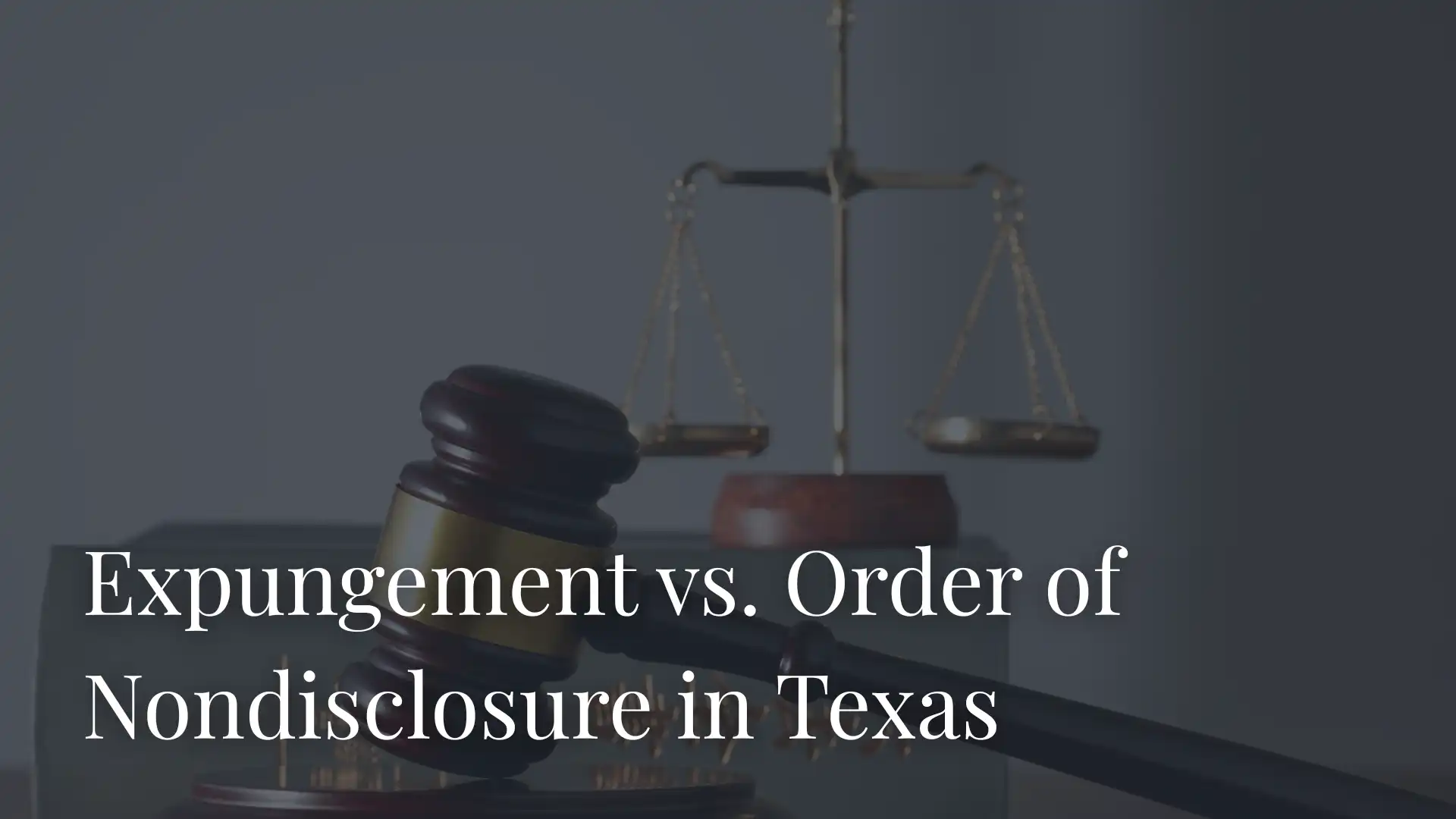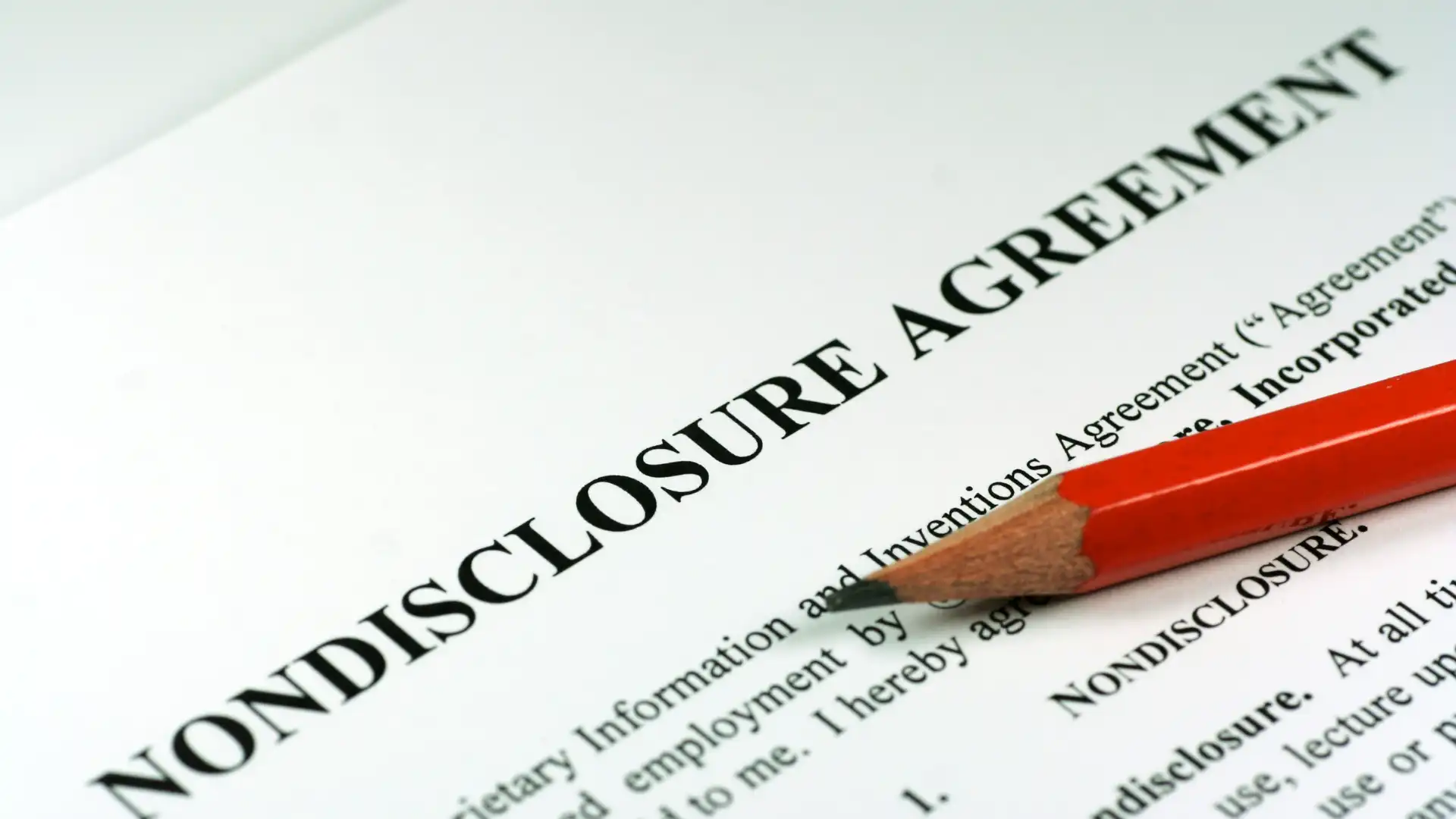 A criminal record, especially for a felony offense, can have catastrophic consequences. That’s why it’s essential to understand your options for clearing your record, like the difference between expunction vs nondisclosure in Texas and how each can impact your future. You might lose your job, have trouble qualifying for credit or housing, or be barred from living or working in specific areas. Ensuring a conviction does not have a detrimental impact on your future means having your records sealed or expunged. That starts with understanding expunction vs. nondisclosure in Texas, as our Dallas criminal defense attorneys explain below.
A criminal record, especially for a felony offense, can have catastrophic consequences. That’s why it’s essential to understand your options for clearing your record, like the difference between expunction vs nondisclosure in Texas and how each can impact your future. You might lose your job, have trouble qualifying for credit or housing, or be barred from living or working in specific areas. Ensuring a conviction does not have a detrimental impact on your future means having your records sealed or expunged. That starts with understanding expunction vs. nondisclosure in Texas, as our Dallas criminal defense attorneys explain below.
Key Differences Between Expunction and Nondisclosure
Both expunctions and orders of nondisclosure can help clear your criminal record in Texas. However, they work in vastly different ways.
Expunction completely erases a qualifying arrest or charge, as if it never happened. If granted, you can legally deny the incident ever took place, even under oath.
By contrast, an order of nondisclosure doesn’t erase the record but seals it from public view. Government agencies may still access it, though employers and landlords generally can’t.
Expunctions apply to arrests and are available only in limited situations, like cases that were dismissed, never filed, or ended in acquittal or a pardon. Orders of nondisclosure apply to specific charges, usually after completing deferred adjudication and a waiting period. Deferred adjudication is a plea deal where you plead guilty or no contest, but the judge delays entering a conviction. If you complete probation, the judge dismisses the case, and you avoid a final conviction on your record.
Who Qualifies for Each Option?
There are strict eligibility requirements for expungements and orders of nondisclosure in Texas:
Expungements
The qualifications for having your criminal record expunged include:
- You were arrested but never charged – You might qualify for expungement if the statute of limitations has passed or the state never filed charges.
- Your case was dismissed – The state must have dropped your charges without any supervised probation. Class C misdemeanors with deferred adjudication are also eligible because Class C misdemeanors do not have supervised probation.
- You were acquitted at trial – A not guilty verdict makes you eligible for expunction, which removes your initial arrest from public databases.
- You received a pardon – Expungement is possible if the governor or president pardons you for your offense.
- You completed a pretrial diversion program – Many first-time offenders qualify for these programs. Successful completion may allow you to expunge your record.
- You were a victim of identity theft – If someone else used your name and caused a criminal record, you may be able to clear your name through expungement.
- Under certain circumstances, a conviction under Chapter 106 of the Texas Alcoholic Beverage Code may be expunged when the defendant turns 21-years old.
Orders of Nondisclosure
The qualifications for a nondisclosure order include:
- You completed deferred adjudication – You must finish the probation period successfully without violating the court’s terms to qualify for a nondisclosure order.
- You were convicted of a low-level offense – Some misdemeanor convictions now qualify for nondisclosure orders, even without deferred adjudication. Examples include some theft crimes, criminal mischief, disorderly conduct, and trespassing.
- You waited the required time – There is often a 2–5 year waiting period, depending on the offense.
- You haven’t been convicted or placed on deferred adjudication for any offense, other than a transportation code violation, after entering a plea of guilty or no contest in the case for which you are seeking nondisclosure – Any criminal activity after you begin community supervision may disqualify you from a nondisclosure order.
- You weren’t charged with a disqualifying offense – Violent crimes, sex offenses, family violence, and certain other crimes can’t be sealed.
How to File for Expunction or Nondisclosure in Texas
 Here’s a step-by-step guide about how to file for expunction or a nondisclosure in Texas:
Here’s a step-by-step guide about how to file for expunction or a nondisclosure in Texas:
Filing for Expunction in Texas
- Check your eligibility – Make sure your case qualifies. You must meet the rules for expungement based on how your case ended.
- Get your criminal records – Collect details like your arrest date, the charge, where it happened, and how the case concluded.
- Complete the Petition for Expunction – This form officially asks the court to erase your records. You’ll need your full case details and a list of agencies involved in your arrest or prosecution.
- File the petition with the district court – Submit the form in the same county where the arrest or charge occurred. You must pay a filing fee unless you receive a fee waiver.
- Serve the petition to the relevant agencies – Send copies to all the agencies you named in the form. For example, you should send the petition to the arresting police department and the district attorney.
- Attend the hearing – You might need to explain your petition to a judge. Be prepared to describe why you qualify and answer specific legal questions about your situation.
- Get the expunction order – If the judge approves your request, they’ll sign the expunction order. The agencies named in the petition must then destroy or erase your records.
Filing for an Order of Nondisclosure in Texas
- Confirm your eligibility – Make sure your offense and case outcome qualify. Usually, only deferred adjudications or some first-time misdemeanor convictions qualify for nondisclosure orders.
- Finish any waiting period – Some offenses require a waiting period (typically 2–5 years) after you complete your sentence or probation before you can seek a nondisclosure order.
- Gather your case records – You’ll need info about the offense, court dates, and proof that you completed all terms of your sentence.
- File a Petition for Nondisclosure – Submit this form in the court that handled your case. Include details about your case and the agencies involved.
- Notify the relevant agencies – Give copies to the prosecutor and other listed agencies so they can respond.
- Attend the court hearing (if scheduled) – Some cases require a hearing, especially if the prosecution objects to your petition. If your case requires a hearing, make sure you bring a lawyer to represent you and answer any questions about your situation.
- Get the signed order – If the judge agrees to your petition, the agencies included will seal your records from public view.
Contact Our Dallas Expungement Lawyers Today for Help Sealing Your Criminal Records
My Dallas Criminal Lawyer has experience and inside knowledge to help you seal your records so they can no longer affect your life. Whether you’re seeking expungement or a nondisclosure order in Dallas, we can handle the paperwork and represent you in any hearings. We can also notify the appropriate agencies and counter any efforts to block your petition.
Let our lawyers help you clear your name. Call 214-949-4117 now or complete our contact form for a free case review.





